Student Thesis
COPICOH supervises Bachelor's and Master's theses in the relevant study programs of the University of Lübeck (Computer Science, Media Informatics, Medical Informatics, Nursing Sciences). We always have a range of interesting topics on offer. Interested students like to contact us!
Here are examples of some current work from the center.
Robotic automation in the Skills Lab
Eike Lukas Schulz (Bachelor thesis, Robotics and Autonomous Systems, May 6, 2022)
First referee: Prof. Dr. Andreas Schrader (ITM)
Second referee: Prof. Dr. Philipp Rostalski (IME)
Topic: Skills labs are used to train practical handling skills in medicine and health sciences. The experimental setups are sometimes complex and require different furniture, utensils and simulation devices depending on the experiment. The task of this thesis is the development of a concept and the prototypical implementation of a comprehensive automation system for warehouse logistics in Skills Labs.
Development of a platform for dynamic tutorials within the ACTIVATE project
Malgorzata Mlostek (Bachelor Thesis, Computer Science, May 27, 2021)
First examiner: Prof. Dr. Andreas Schrader (ITM)
Second referee: Prof. Dr. Nicole Jochems (IMIS)
Supervisor: Börge Kordts (ITM)
Topic: In the project ACTIVATE an interactive information and communication platform for ventilated intensive care patients is developed. It is controlled by an innovative ball-shaped interaction device (BIRDY). In this work, a tutorial system was developed that introduces users to the operation of the system. The special challenge is the cognitive and physical impairment of weaning patients.
Extensions of usability labs for the context of ambient systems with a focus on 3D spatial sensing
Tristan Kersten (Master's thesis, Entrepreneurship in digital technologies, February 21, 2020)
First examiner: Prof. Dr. Andreas Schrader (ITM)
Second referee: Prof. Dr. Thilo Mentler (IMIS)
Supervisor: Bennet Gerlach (ITM)
Topic: In this thesis a support system for ambient usability labs was developed. In particular, the system supports the recording of 3D point clouds fused from multiple depth cameras for the retrospective assessment of workflows in skills labs.
Development of a control system for the interaction device BIRDY
Erik Boback (Bachelor thesis, Media Informatics, October 29, 2019)
First examiner: Prof. Dr. Andreas Schrader (ITM)
Second referee: Prof. Dr. Nicole Jochems (IMIS)
Supervisor: Börge Kordts (ITM)
Topic: The aim of this bachelor thesis is to support the communication of weaning patients in intensive care units. For this purpose, a control system for the BIRDY input system was developed in the ACTIVATE project. The patients receive support for reorientation by accessing information and controlling ambient systems in the room.
Development of a 3D Editor for Labanotation
Kathleen Anderson (Bachelor thesis, Media Informatics, August 26, 2019)
First examiner: Prof. Dr. Andreas Schrader (ITM)
Second reviewer: Prof. Dr. Nicole Jochems (IMIS)
Supervisor: Börge Kordts (ITM)
Topic: In this thesis a tool was developed that supports interaction designers in defining, comparing, and analyzing human movements by using labanotation. The learning phase needed to understand the basic principles of the notation language is shortened. The application enables the user to create Labanotation in 3D and understand the concept of notation through exploration.
User-centered development of a human-machine interface for mechanically ventilated intensive care patients using a ball-shaped input device
Ann-Kathrin Vanderelke (Master thesis, Medical Informatics, January 16, 2019)
First examiner: Prof. Dr. Nicole Jochems (IMIS)
Second Opinion: Prof. Dr. Andreas Schrader (ITM)
Supervisor: Jan Kopetz (IMIS)
Topic: The thesis addresses an intensive state of the art analysis as well as the conception and prototypical implementation of a user interface for a novel ball-shaped interaction device using a user centered design process. A particular challenge is the specific support of the special degrees of freedom of a ball with a specific repertoire of gestures.
Konzeption und Entwicklung einer Kommunikationsunterstützung für künstlich beatmete Intensivpatienten
Svenja Burgsmüller (Masterarbeit, Medizinische Informatik, 9. Januar 2019)
Erstgutachter: Prof. Dr. Nicole Jochems (IMIS)
Zweitgutachten: Prof. Dr. Andreas Schrader (ITM)
Betreuer: Jan Kopetz (IMIS)
Thema: Die Masterarbeit befasst sich mit der Fragestellung wie Inhalte, die von beatmeten Intensivpatienten kommuniziert werden möchten, visualisiert werden können, sodass diese verständlich sind. Diesbezüglich soll eine Teilanwendung der ACTIVATE Patienten-App entwickelt werden, die sich speziell auf die Kommunikation der Zielgruppe fokussiert. Dafür wurden im Vorfeld realitätsnahe Problemszenarien entwickelt, welche eine Basis für die Entwicklung der Kommunikationsunterstützung schaffen. Durch eine umfassende Analyse der Zielgruppe wird ein Verständnis für die Situation, sowie körperliche und kognitive Fähigkeiten geschaffen. Die Gestaltung wird im Rahmen der Konzeption in einem benutzerzentrierten Entwicklungsprozess durchgeführt.
Naturanaloge Verfahren für die dynamische Bindung von Geräteverbünden
Patrick Dresel (Masterarbeit, Informatik, 16. Januar 2019)
Erstgutachter: Prof. Dr. Andreas Schrader (ITM)
Zweitgutachten: Prof. Dr. Philipp Rostalski (IME)
Betreuer: Daniel Burmeister (ITM)
Thema: In dieser Arbeit wird das Ambient Reflection Framework durch neue Algorithmen zur Bindung smarter Geräteverbünde erweitert: ein genetischer Algorithmus, ein Simulated-Annealing-Verfahren und eine Kombination beider Ansätze. In einen iterativen Testverfahren mit simulierten IoT-Verbünden zeigte sich die Überlegenheit gegenüber herkömmlichen Ansätzen zur Lösung des bipartiten Graph Matching-Problems.
Redundancy in machine learning
Jessica Lückert (Bachelor Thesis, Medical Informatics, 14.12.2018)
First Referee: Prof. Dr. Ralf Möller (IFIS)
Second Referee: Prof. Dr. Josef Ingenerf (IMI)
The central idea of the work is to examine a Naive Bayes classifier to determine whether a learned parameter configuration for a particular model instance can be influenced by the explicit addition of tuple duplicates. A data model for sepsis detection was used together with corresponding data records. To solve the learning problem regarding a denormalized version of the sepsis data, algorithms implemented in Python are used.
Probabilistic data exchange
Julia Remes (Bachelor Thesis, Computer Science, 14.12.2018)
First Referee: Prof. Dr. Ralf Möller (IFIS)
Second Referee: Prof. Dr. Josef Ingenerf (IMI)
The central idea of his work is to represent the marked zero values in the target database, which are created during the mapping by the application of the rules, by number vectors (realized as an internal additional attribute of the corresponding table). The vectors have a location for each attribute, with the number 0 representing the attribute value of a non-zero vector position in the corresponding column and a natural number representing the name of a null value in the corresponding column of the table. Requests to the target database must be rewritten in accordance with this idea of marked null values to transparently translate the semantics of selected null values relative to the join operation (and other operations).
Integration of Medical Data with Temporal Probabilistic Databases
Matthias Wöhler (Bachelor Thesis, Medical Informatics, 27.11.2018)
First Referee: Prof. Dr. Ralf Möller (IFIS)
Second Referee: Prof. Dr. Josef Ingenerf (IMI)
Advisor: Marcel Gehrke
In the bachelor thesis it was examined to what extent temporal probabilistic databases (TPBDs) can be used in the medical context, in which an ambient assisted living scenario was played through. It was examined whether TPDBs can help patients to be cared for longer at home.
Query Answering under Uncertainty and Temporal Validity Restrictions
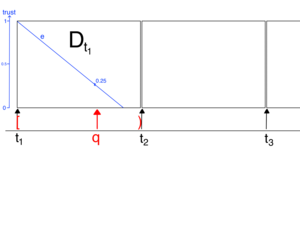
Simon Paasche (Bachelor Thesis, Medical Informatics, 20.11.2018)
First Referee: Prof. Dr. Ralf Möller (IFIS)
Second Referee: Prof. Dr. Josef Ingenerf (IMI)
Advisor: Marcel Gehrke
In the bachelor thesis it was examined to what extent an extension of relational databases is temporally restricted and linked to a constant probability or time-dependent probability function. Thus, one can then decide whether already performed tests measurements for the current diagnosis must be performed.
Learning Probabilistic Relational Models
Maurice Sambale (Master thesis, Informatik, 10.10.2018)
First Referee: Prof. Dr. Ralf Möller (IFIS)
Second Referee: Prof. Dr. Heinz Handels (IMI)
In the master's thesis it was investigated how a so-called probabilistic relational model (PRM) can be obtained for a scope of application from a relational database over the scope of application. The scope has been removed from the context of production machines e.g. chosen for medicines and their packaging.
Conception and development of telepresence middleware
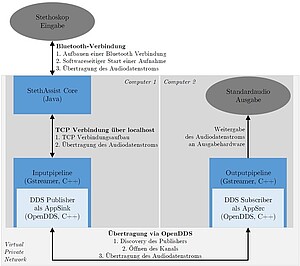
Nils Ihnken (Bachelor Thesis, IT Security, October 2018)
First Referee: Prof. Dr. rer. nat. Stefan Fischer (ITM)
Advisor: Raphael Allner
In this work, a telepresence middleware was designed and developed. The motivation is to enable physicians to remotely treat and diagnose patients over the Internet. The analysis of the actuators showed that 70% of the diagnoses can already be made after the doctor-patient interview before the examination. In addition, the relationship of trust between doctor and patient is essential for the treatment. Furthermore, patient confidentiality must be respected. For the conception of the middleware, it means that not only a transmission of an examination instrument is made possible, but also the transmission of image and language.
More information
Enhanced Relational Topic Modeling with Named Entity Induced Links
Mathis Lichtenberger (master thesis, computer science, 19.09.2018)
First Referee: Prof. Dr. Ralf Möller (IFIS)
Second Referee: Prof. Dr. Elmar Rückert (ROB)
In the master's thesis, it was investigated how to use implicit links of documents (texts) by shared named entities (Named Entities, NEs) to an automatically determined relational topic characterization of documents (Relational Topic Modeling, RTM, according to Chang & Lead 09). A Topic Model is a distribution of words that are potentially present in a text of a particular class. Relational topic characterizations refer to relations between documents (e.g., citation relationships, correspondence relationships by common occurrence in hand libraries, etc.). Learning methods for RTMs with a correspondence relation formed by shared named entities (so-called NE-RTMs) had to be developed. It was also part of the work to design an appropriate RTM assessment model so that the quality of RTM prediction requests for new documents and their relationships to known documents with NE-RTMs can be meaningfully measured.
Development of a Kinesthetic Telepresence Lab
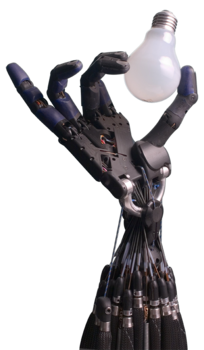
Jan Niklas Rösch (Bachelor Thesis, Media Informatics, September 2018)
First Referee: Prof. Dr. rer. nat. Stefan Fischer (ITM)
Advisor: Raphael Allner
In the context of this work the conception and subsequent realization of a test laboratory for telemedical input devices is described. In the process, both a physical test laboratory and a simulator were developed in which various control options can be embedded and tested using medical treatments. In this case, this system should be used to be able to evaluate requirements for these input devices in the medical context. The structure of the laboratory and the simulator was designed so that new deviceseasily integrated and combined with existing systems.
Development of a mobile patient call system
Julia Wegener (née Abeler) (Master Thesis, Medical Informatics, August 18, 2018)
First Referee: Prof. Dr. Andreas Schrader (ITM)
Second Referee: Prof. Dr. Nicole Jochems (IMIS)
In cooperation with Prof. Dr. Katrin Balzer (ISE)
In the work a new mobile patient call system with focus on communication between patient and nurse was developed. Using qualitative observational studies and interviews, the analysis found that for patients, a simple intuitive system with direct feedback and for caregivers, more effective prioritization and location-independent answering of calls is crucial. The prototype was developed with the help of VueJS in the form of a web application in a user centered design process.
System for recording activities in the usability lab
Salvatore Cancilliere (Bachelor Thesis, Computer Science, May 24, 2018)
First Referee: Prof. Dr. Andreas Schrader (ITM)
Second Referee: Prof. Dr. Nicole Jochems (IMIS)
Advisor: Bennet Gerlach (ITM)
This thesis deals with the storage of information from sensors and IoT devices in the ambient usability laboratory, including video streams based on Node.js. The control takes place via a web interface.
Context-sensitive presentation of information with the aid of mobile projectors
Hanin Kadri (Bachelor Thesis, Computer Science, April 23, 2018)
First Referee: Prof. Dr. Andreas Schrader (ITM)
Second Referee: Prof. Dr. Nicole Jochems (IMIS)
Advisor: Bennet Gerlach (ITM)
This work describes the development of motor driven projectors, which allows to project information on potentially arbitrary surfaces in an ambient care environment. The implementation took place with the help of an own construction on the basis of stepper motors.
Development of a system to support motion analysis
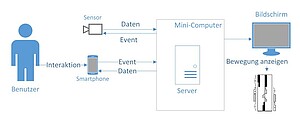
Maurice Grefe (Bachelor Thesis, Computer Science, 08.03.2018)
First Referee: Prof. Dr. Andreas Schrader (ITM)
Second Referee: Prof. Dr. Tilo Mentler (IMIS)
The work describes the development of a server for the automatic recognition of gestures for use in sports studios. The goal is to provide training feedback through motion analysis using wireless transmission with time-of-flight cameras.
Support for rehab through an innovative camera system
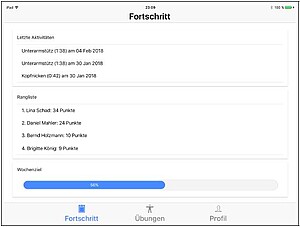
First reviewer: Prof. Dr. Andreas Schrader (ITM)
Second reviewer: Dr. Sven Groppe (IFIS)
In the Media Informatics degree program, Ms Lina Schad successfully completed her master's thesis on "GROoM - A Camera-Based System to Support Rehabilitation Therapy".
Under the supervision of Prof. Schrader (ITM) and with the kind support of PD Dr. Ruth Deck from the Department of Rehabilitation Research (ISE) has implemented a system that provides motivational support for post-rehabilitation exercise especially for patients with chronic back pain. Gamification methods have been integrated into an app that promotes the achievement of personal goals through a playful approach.
Literature: Lina Schad: "GROoM - A camera-based system to support rehabilitation therapy", master thesis, Institute of Telematics at the University of Lübeck, 14.02.2018.
Conception and realization of an instant messenger for use in everyday medical work
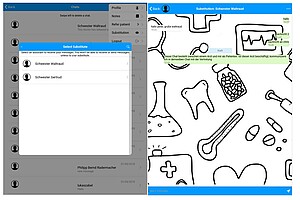
Jonas Franke (Bachelor Thesis, Medical Informatics, 08.02.2018)
First Referee: Prof. Dr. Stefan Fischer (ITM)
Second Referee: Prof. Dr. Josef Ingener (IMI)
The subject of this work was to design and develop a suitable instant messenger for everyday medical work. An extensive context analysis was carried out, in which the diverse facets of the health care system were examined and existing communication processes were examined. On the basis of the findings gained here, the goal-oriented conception and implementation follows.
Application of the Baum-Welch algorithm for learning DBNs from PhysioNet data
Florian Ott (Bachelor Thesis, Computer Science, 04.01.2018)
First Referee: Prof. Dr. Ralf Möller (IFIS)
Second Referee: Prof. Dr. Josef Ingener (IMI)
Advisor: Marcel Gehrke
In the bachelor thesis it was investigated to what extent a discrete model for ECG signals in non-monitored form can be learned with the help of the Baum-Welch algorithm, so that a heartbeat detection can be made possible also with disturbances in the ECG data.
Machine learning based end user support in the context of IT security
Raphael Süs (Master Thesis, Medical Informatics, 29.12.2017)
First Referee: Prof. Dr. Ralf Möller (IFIS)
Second Referee: Prof. Dr. Heinz Handels (IMI)
In the master thesis, it was examined how to find suitable text documents from a given directory in a simple dialog with an IT search system, so that adequate information is provided for a task.
Concept and prototype of a web application for organizing and conducting video-lessons
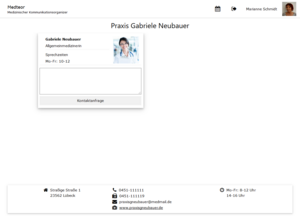
Dennis Labitzke (Master Thesis, Medical Informatics, 14.12.2017)
First Referee: Prof. Dr. Stefan Fischer (ITM)
Second Referee: Prof. Dr. Josef Ingener (IMI)
As part of this work, a system has been designed and developed that allows simple and straightforward planning and execution of such video-sharing sessions. For this purpose, tendencies in terms of user requirements were identified within the framework of a study evaluation.
The result is an application that allows one to create virtual connections between patients and their doctors and, on the other hand, offers the opportunity to organize and conduct video-consultation sessions.
Knowledge Enrichment of Documents using Topic Distributions and RDF Triple Structures
Bjarne Witten (Master Thesis, Entrepreneurship in Digital Technologies, 27.10.2017)
First Referee: Prof. Dr. Ralf Möller (IFIS)
Second Referee: Prof. Dr. Stefan Fischer (ITM)
Advisor: Felix Kuhr
In the master thesis it was examined how it is possible, in a non-supervised learning scenario, to automatically enrich certain relational descriptions for the contents of text documents on the basis of a (large) directory of preprocessed documents, so that the content is better described than without enrichment.
Automatically customized text entry and self-description for IoT ensembles in the hospital
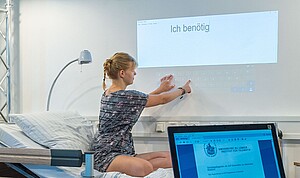
Jasmin Wollgast (Bachelor Thesis, Media Informatics, 28.08.2017)
First Referee: Prof. Dr. Andreas Schrader (ITM)
Second Referee: Prof. Dr. Tilo Mentler (IMIS)
In the work, intuitive text input methods (speech, gestures, virtual keyboards, etc.) were examined for their useful use in nursing everyday life. The work was developed in collaboration with Prof. Katrin Balzer from the Department of Nursing Research at the Institute for Social Medicine and Epidemiology.
Appears in: "Text Input in Hospital Settings Using IoT Device Ensembles", 20th Congress International Ergonomics Association (IEA'2018), Florence, 26.-28. August 2018. http://iea2018.org/
Development of the concept of a mobile application for monitoring nutrient uptake in the vegan diet
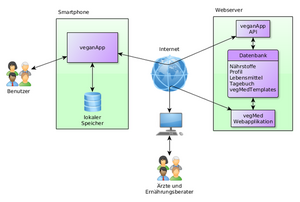
Julia Struwe (Bachelor Thesis, Computer Science, July 2017)
First Referee: Prof. Dr. Andreas Schrader (ITM)
Second Referee: Prof. Dr. Nicole Jochems (IMIS)
With the support of Prof. Dr. Christian Sina and PD Dr. rer. Hum. Biol. Anika Wagner (Institute of Nutritional Medicine)
As part of this work, a concept for an app to support the vegan diet and the vegan lifestyle was developed. Based on a state-of-the-art analysis and an online user survey with 576 participants, the essential components for the Feature Driven Development process were specified. The prototypical implementation of a hybrid "veganApp" for mobile devices was scientifically evaluated with the involvement of volunteers. Essential components are a nutrient database and a diary. To generate nutritional hints, the system provides an interface for setting rules by doctors and nutritionists.
Interactive tutorials explaining the interaction possibilities of dynamically networked devices
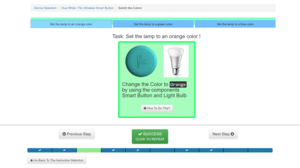
Simon Schmudde (Master Thesis, Media Informatics, June 2017)
First Referee: Prof. Dr. Andreas Schrader (ITM)
Advisor: Daniel Burmeister
To explain and learn how to interact in smart environments, tutorials were generated based on the self-descriptions of smart objects currently available on the network at runtime. These allow users to experience and control the control of device networks in a secure environment in smaller knowledge-based tasks.
Multimodal metadata for information extraction
Phillip Wendland (Master thesis, Informatik, 01.05.2017)
First Referee: Prof. Dr. Ralf Möller (IFIS)
Second Referee: Prof. Dr. Andreas Schrader (ITM)
In the master's thesis, it was examined how it is possible, in a non-supervised learning scenario, to automatically enrich certain multimodal metadata for new documents on the basis of a list of preprocessed documents.
Dynamic networking of intelligent self-described objects
Nicolai Petter (Master Thesis, Media Informatics, January 2017)
First Referee: Prof. Dr. Andreas Schrader (ITM)
Advisor: Daniel Burmeister
This work deals with the dynamic and automated networking of smart objects. For this purpose, the self-descriptions of devices available in the network are analyzed in a central instance and combined in a matching process on the basis of various criteria. The networking information generated thereby is transmitted to the respective devices and thereby enable a direct communication between the devices.
Rule-based context modeling for on-demand delivery of instructions
Jan Pascal Maas (Master Thesis, Computer Science, November 2016)
First Referee: Prof. Dr. Andreas Schrader (ITM)
Advisor: Daniel Burmeister
In this work, a system was designed and designed, which delivers at runtime generated instructions from networked device networks in smart environments on the networks as best as possible. Experts in the field of media psychology can influence the course of delivery and the media presentation through created interfaces, in which they create stereotypes and deposit these rulesets.
The stereotypes are compared with mathematical distance metrics and thus a user-adapted generation and delivery of the instructions for use possible..
Use of interactive data glasses to support and enhance the competence of nurses in education
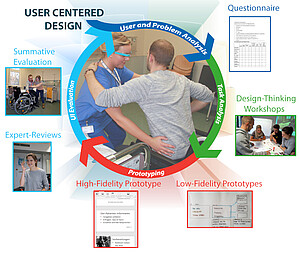
Jan Kopetz (Master Thesis, Media Informatics, November 2016)
First Referee: Prof. Nicole Jochems (IMIS)
The master thesis of Jan Kopetz showed that the use of interactive data glasses has potential in the context of the practical training of nurses.
A next step is the development of a system architecture to enable the presentation of dynamic content on data glasses.
The work was honored as the best Master's thesis in Media Informatics 2016 during the EMI Awards 2017.

- Teaching
- Student Thesis
- Project Work
- Further Education

![[Translate to english:] Link COPICOH [Translate to english:] Link COPICOH](/fileadmin/_processed_/9/1/csm_LI-In-Bug_8ed46db0dc.png)
![[Translate to english:] Link COPICOH [Translate to english:] Link COPICOH](/fileadmin/_processed_/1/b/csm_vimeo_icon_white_on_blue_rounded_b79e632cf7.png)